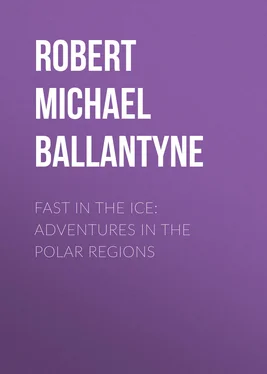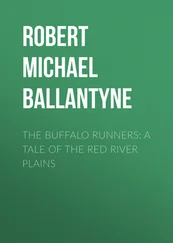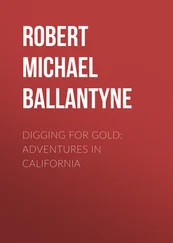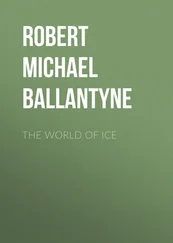Robert Michael Ballantyne - Fast in the Ice - Adventures in the Polar Regions
Здесь есть возможность читать онлайн «Robert Michael Ballantyne - Fast in the Ice - Adventures in the Polar Regions» — ознакомительный отрывок электронной книги совершенно бесплатно, а после прочтения отрывка купить полную версию. В некоторых случаях можно слушать аудио, скачать через торрент в формате fb2 и присутствует краткое содержание. Жанр: Детские приключения, literature_19, foreign_antique, foreign_prose, foreign_children, на английском языке. Описание произведения, (предисловие) а так же отзывы посетителей доступны на портале библиотеки ЛибКат.
- Название:Fast in the Ice: Adventures in the Polar Regions
- Автор:
- Жанр:
- Год:неизвестен
- ISBN:нет данных
- Рейтинг книги:5 / 5. Голосов: 1
-
Избранное:Добавить в избранное
- Отзывы:
-
Ваша оценка:
- 100
- 1
- 2
- 3
- 4
- 5
Fast in the Ice: Adventures in the Polar Regions: краткое содержание, описание и аннотация
Предлагаем к чтению аннотацию, описание, краткое содержание или предисловие (зависит от того, что написал сам автор книги «Fast in the Ice: Adventures in the Polar Regions»). Если вы не нашли необходимую информацию о книге — напишите в комментариях, мы постараемся отыскать её.
Fast in the Ice: Adventures in the Polar Regions — читать онлайн ознакомительный отрывок
Ниже представлен текст книги, разбитый по страницам. Система сохранения места последней прочитанной страницы, позволяет с удобством читать онлайн бесплатно книгу «Fast in the Ice: Adventures in the Polar Regions», без необходимости каждый раз заново искать на чём Вы остановились. Поставьте закладку, и сможете в любой момент перейти на страницу, на которой закончили чтение.
Интервал:
Закладка:
R. M. Ballantyne
Fast in the Ice: Adventures in the Polar Regions
Chapter One
One day, many years ago, a brig cast off from her moorings, and sailed from a British port for the Polar Seas. That brig never came back.
Many a hearty cheer was given, many a kind wish was uttered, many a handkerchief was waved, and many a tearful eye gazed that day as the vessel left Old England, and steered her course into the unknown regions of the far north.
But no cheer ever greeted her return; no bright eyes ever watched her homeward-bound sails rising on the far-off horizon.
Battered by the storms of the Arctic seas, her sails and cordage stiffened by the frosts, and her hull rasped and shattered by the ice of those regions, she was forced on a shore where the green grass has little chance to grow, where winter reigns nearly all the year round, where man never sends his merchandise, and never drives his plough. There the brig was frozen in; there, for two long years, she lay unable to move, and her starving crew forsook her; there, year after year, she lay, unknown, unvisited by civilised man, and unless the wild Eskimos 1 1 This word is here spelled as pronounced. It is usually spelled Esquimaux.
have torn her to pieces, and made spears of her timbers, or the ice has swept her out to sea and whirled her to destruction, there she lies still—hard and fast in the ice.
The vessel was lost, but her crew were saved, and most of them returned to tell their kinsfolk of the wonders and the dangers of the frozen regions, where God has created some of the most beautiful and some of the most awful objects that were ever looked on by the eye of man.
What was told by the fireside, long ago, is now recounted in this book.
Imagine a tall, strong man, of about five-and-forty, with short, curly black hair, just beginning to turn grey; stern black eyes, that look as if they could pierce into your secret thoughts; a firm mouth, with lines of good-will and kindness lurking about it; a deeply-browned skin, and a short, thick beard and moustache. That is a portrait of the commander of the brig. His name was Harvey. He stood on the deck, close by the wheel, looking wistfully over the stern. As the vessel bent before the breeze, and cut swiftly through the water, a female hand was raised among the gazers on the pier, and a white scarf waved in the breeze. In the forefront of the throng, and lower down, another hand was raised; it was a little one, but very vigorous; it whirled a cap round a small head of curly black hair, and a shrill “hurrah!” came floating out to sea.
The captain kissed his hand and waved his hat in reply; then, wheeling suddenly round, he shouted, in a voice of thunder:
“Mind your helm, there; let her away a point. Take a pull on these foretopsail halyards; look alive, lads!”
“Aye, aye, sir!” replied the men.
There was no occasion whatever for these orders. The captain knew that well enough, but he had his own reasons for giving them. The men knew that, too, and they understood his reasons when they observed the increased sternness of his eyes, and the compression of his lips.
Inclination and duty! What wars go on in the hearts of men—high and low, rich and poor—between these two. What varied fortune follows man, according as the one or the other carries the day.
“Please, sir,” said a gruff, broad-shouldered, and extremely short man, with little or no forehead, a hard, vacant face, and a pair of enormous red whispers; “please, sir, Sam Baker’s took very bad; I think it would be as well if you could give him a little physic, sir; a tumbler of Epsom, or some-think of that sort.”
“Why, Mr Dicey, there can’t be anything very far wrong with Baker,” said the captain, looking down at his second mate; “he seems to me one of the healthiest men in the ship. What’s the matter with him?”
“Well, I can’t say, sir,” replied Mr Dicey, “but he looks ’orrible bad, all yellow and green about the gills, and fearful red round the eyes. But what frightens me most is that I heard him groanin’ very heavy about a quarter of an hour ago, and then I saw him suddenly fling himself into his ’ammock and begin blubberin’ like a child. Now, sir, I say, when a grow’d-up man gives way like that, there must be some-think far wrong with his inside. And it’s a serious thing, sir, to take a sick man on such a voyage as this.”
“Does he not say what’s wrong with him?” asked the captain.
“No, sir; he don’t. He says it’s nothin’, and he’ll be all right if he’s only let alone. I did hear him once or twice muttering some-think about his wife and child; you know, sir, he’s got a young wife, and she had a baby about two months ’fore we came away, but I can’t think that’s got much to do with it, for I’ve got a wife myself, sir, and six children, two of ’em bein’ babies, and that don’t upset me , and Baker’s a much stronger man.”
“You are right, Mr Dicey, he is a much stronger man than you,” replied the captain, “and I doubt not that his strength will enable him to get over this without the aid of physic.”
“Very well, sir,” said Mr Dicey.
The second mate was a man whose countenance never showed any signs of emotion, no matter what he felt. He seldom laughed, or, if he did, his mouth remained almost motionless, and the sounds that came out were anything but cheerful. He had light grey eyes which always wore an expression of astonishment; but the expression was accidental; it indicated no feeling. He would have said, “Very well, sir,” if the captain had refused to give poor Baker food instead of physic.
“And hark’ee, Mr Dicey,” said the captain, “don’t let him be disturbed till he feels inclined to move.”
“Very well, sir,” replied the second mate, touching his cap as he turned away.
“So,” murmured the captain, as he gazed earnestly at the now distant shore, “I’m not the only one who carries a heavy heart to sea this day and leaves sorrowing hearts behind him.”
Chapter Two
At Sea—The First Storm
It is now hundreds of years since the North polar regions began to attract general attention. Men have long felt very inquisitive about that part of the earth, and many good ships, many noble lives have been lost in trying to force a passage through the ice that encumbers the Arctic seas, summer and winter. Britain has done more than other nations in the cause of discovery within the Arctic circle. The last and greatest of her Arctic heroes perished there—the famous Sir John Franklin.
Were I writing a history of those regions I would have much to say of other countries as well as of our own. But such is not my object in this book. I mean simply to follow in the wake of one of Britain’s adventurous discoverers, and thus give the reader an idea of the fortunes of those gallant men who risk life and limb for the sake of obtaining knowledge of distant lands.
There have always been restless spirits in this country. There have ever been men who, when boys, were full of mischief, and who could “settle to nothing” when they grew up. Lucky for us, lucky for the world, that such is the case! Many of our “restless spirits,” as we call them, have turned out to be our heroes, our discoverers, our greatest men. No doubt many of them have become our drones, our sharpers, our blacklegs. But that is just saying that some men are good, while others are bad—no blame is due to what is called the restlessness of spirit. Our restless men, if good, find rest in action; in bold energetic toil; if bad, they find rest, alas! in untimely graves.
Captain Harvey was one of our restless spirits. He had a deeply learned friend who said to him one day that he felt sure “ there was a sea of open water round the North Pole !” Hundreds of ships had tried to reach that pole without success, because they always found a barrier of thick ice raised against them. This friend said that if a ship could only cut or force its way through the ice to a certain latitude north, open water would be found. Captain Harvey was much interested in this. He could not rest until he had proved it. He had plenty of money, so had his friend. They resolved to buy a vessel and send it to the seas lying within the Arctic circle. Other rich friends helped them; a brig was bought, it was named the Hope , and, as we have seen in the last chapter, it finally set sail under command of Captain Harvey.
Читать дальшеИнтервал:
Закладка:
Похожие книги на «Fast in the Ice: Adventures in the Polar Regions»
Представляем Вашему вниманию похожие книги на «Fast in the Ice: Adventures in the Polar Regions» списком для выбора. Мы отобрали схожую по названию и смыслу литературу в надежде предоставить читателям больше вариантов отыскать новые, интересные, ещё непрочитанные произведения.
Обсуждение, отзывы о книге «Fast in the Ice: Adventures in the Polar Regions» и просто собственные мнения читателей. Оставьте ваши комментарии, напишите, что Вы думаете о произведении, его смысле или главных героях. Укажите что конкретно понравилось, а что нет, и почему Вы так считаете.












